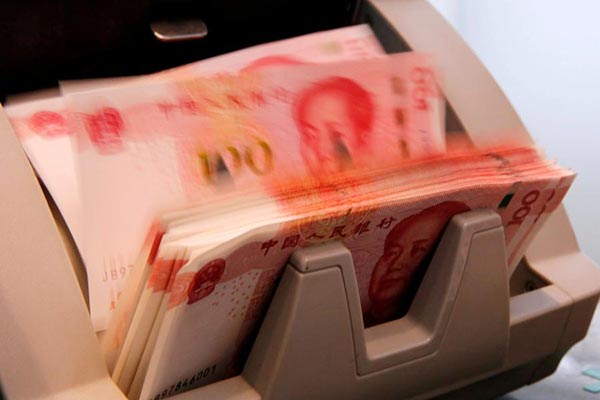Ministry plans rules to curb PPP misuse
 |
|
Chinese 100 yuan banknotes are seen in a counting machine while a clerk counts them at a branch of a commercial bank in Beijing, March 30, 2016. [Photo/Agencies] |
The Ministry of Finance is expected to come out with detailed regulations for public-private partnership projects to curb potential debt risks and prevent the misuse of fiscal funds by local governments, officials said on Wednesday.
The new regulations would also lead to tighter management of the capital sources for PPP projects, prevent high-leveraged borrowing using government expenditure as collateral and excessive commercial bank lending to private parties, said Wang Yi, director of the finance department at the ministry.
The ministry plans to close some irregular projects, especially those that "rely on government expenditure" or do not supply public goods, after a re-evaluation process, even if they have been already approved, he said during a forum for PPP investment in Shanghai.
Vice-Minister of Finance Shi Yaobin said at the same forum that the regulation should be strengthened to clarify the scope of the PPP projects and to reject any "fake" ones that are truly commercial-oriented or unqualified.
"The key is to control the corporate leveraging level and closely watch the risks arising from the off-balance sheet business," said Shi, who sought better coordination between the various government departments to prevent fiscal and financial risks.
According to Shi, some local governments have used the PPP schemes as a cover to make excessive borrowings from banks. Such actions will increase the debt of local governments and fuel potential systematic financial risks.
By the end of September this year, 6,778 PPP projects have entered the development phase, with a total investment amount of 10.1 trillion yuan ($ 1.52 trillion), making China the world's largest PPP market, according to official data.
In April 2015, the ministry introduced a guideline saying that local governments' investment in PPP projects should be no more than 10 percent of their total expenditure for providing general public services. The aim of the guideline was to tame the investment implosion.
"The 10 percent line is the bottom which should never be broken," Shi said.
Draft regulations for PPP projects involving infrastructure construction and public services were published in July for public opinion. The guidelines were drafted by the Legislative Affairs Office of State Council, the National Development and Reform Commission and the Ministry of Finance.
"So far, some basic issues are still under discussion," including how to identify the partnership between the public and private sectors and how various government departments can cooperate in the supervision work, said Zhou Jinsong, deputy head of the Treaty and Laws Department of the Ministry of Finance.
Cao Fuguo, a professor with the Central University of Finance and Economics, suggested that a market-oriented mechanism was necessary to evaluate the risks and returns of the projects, including encouraging participation of third-party financial service institutions and credit ratings agencies.
























